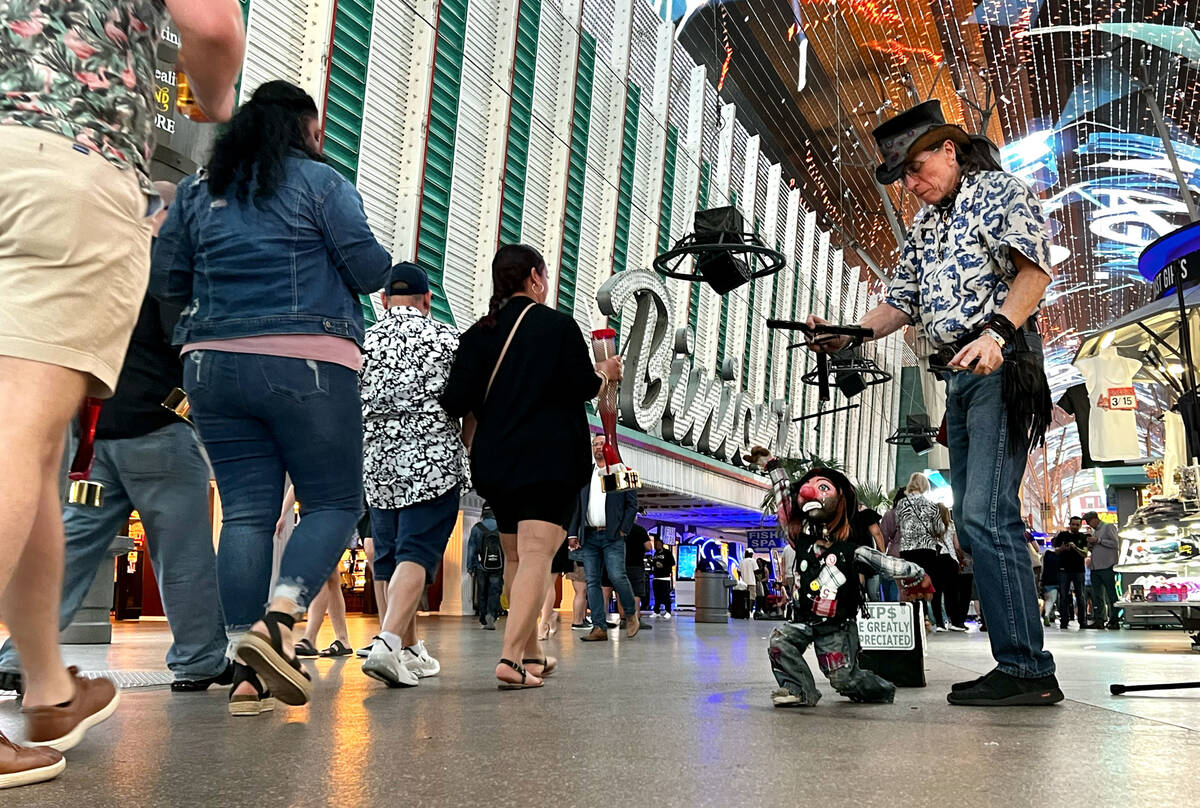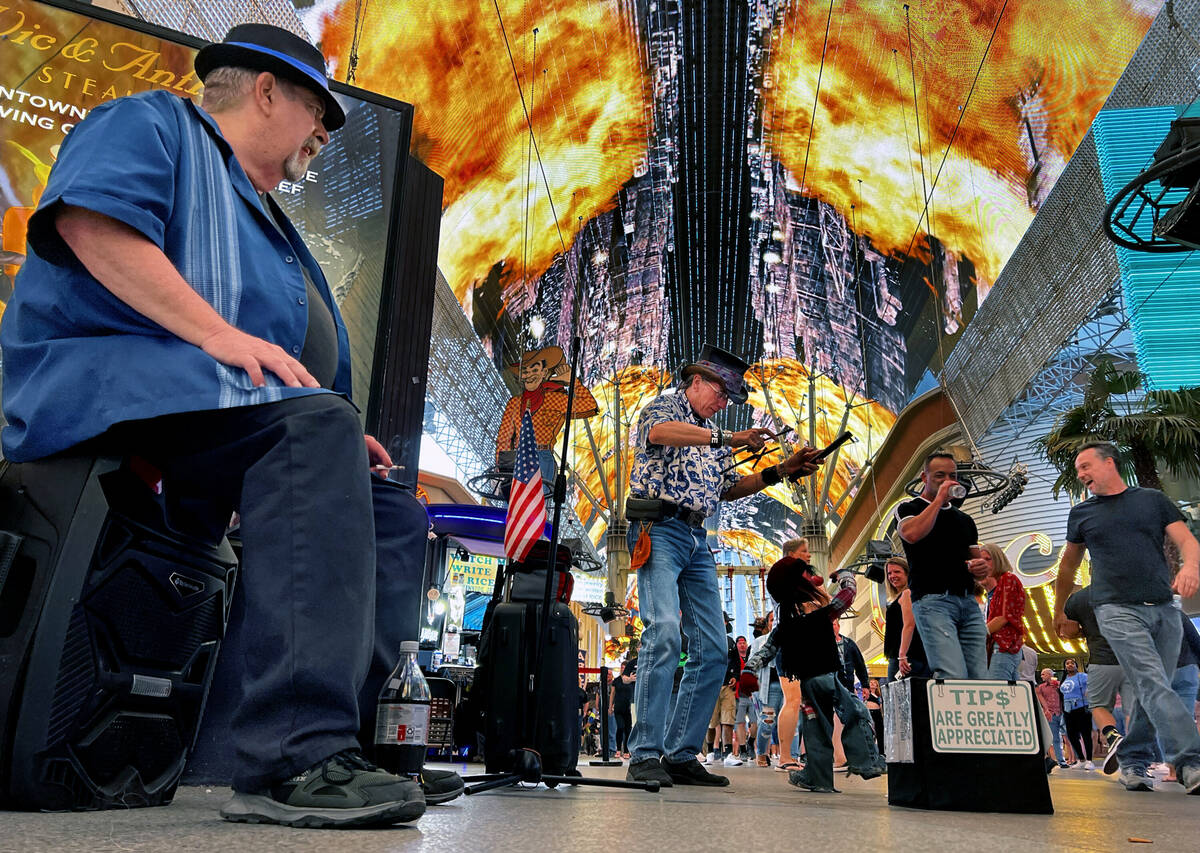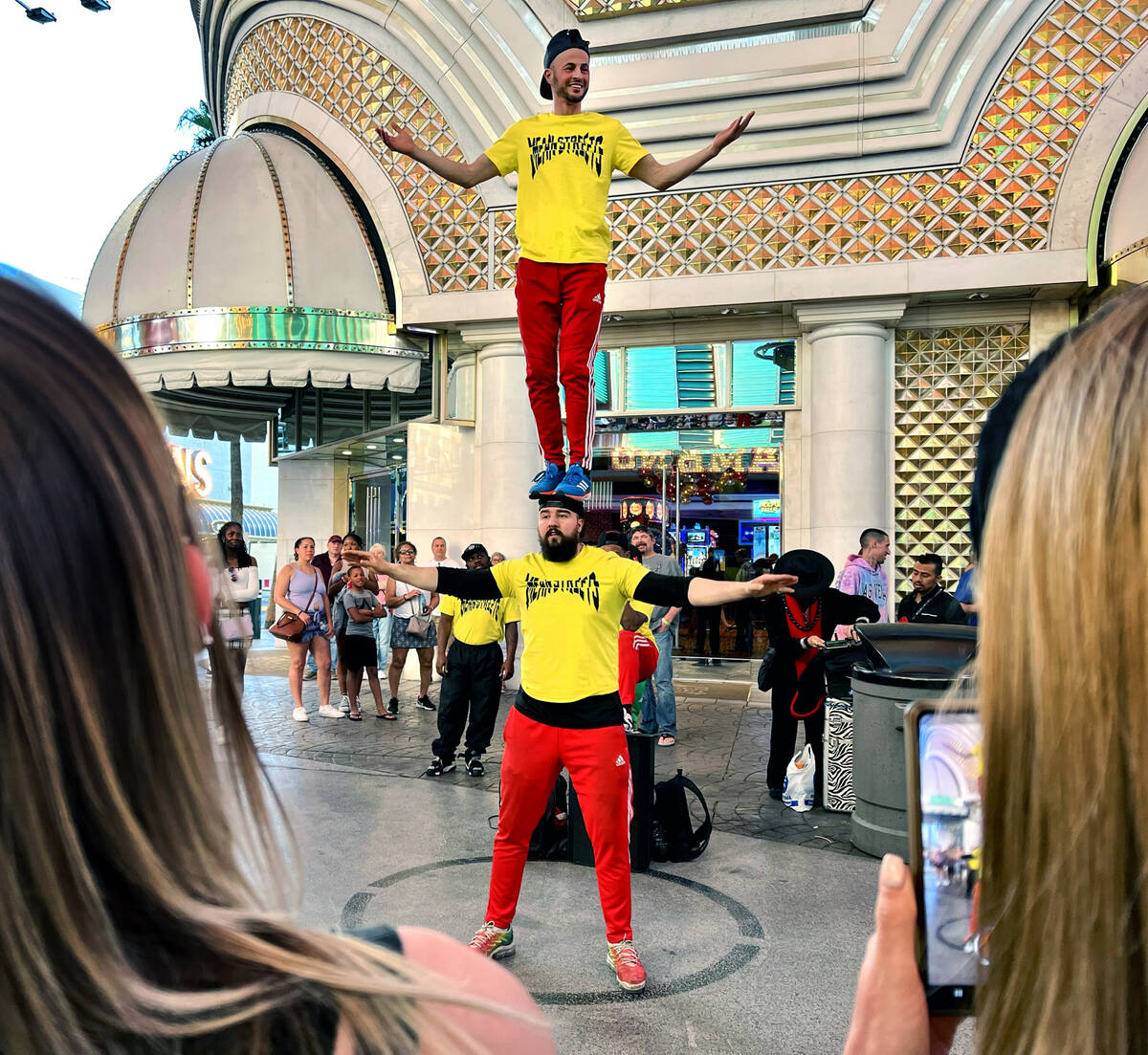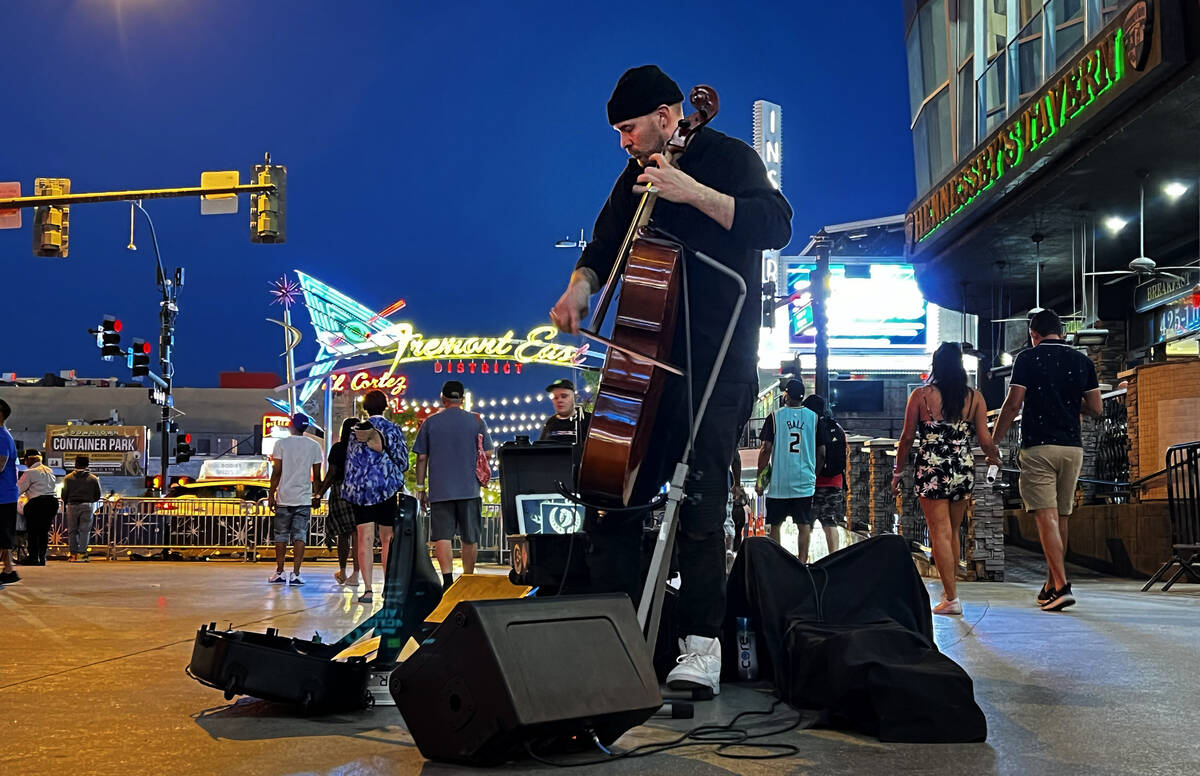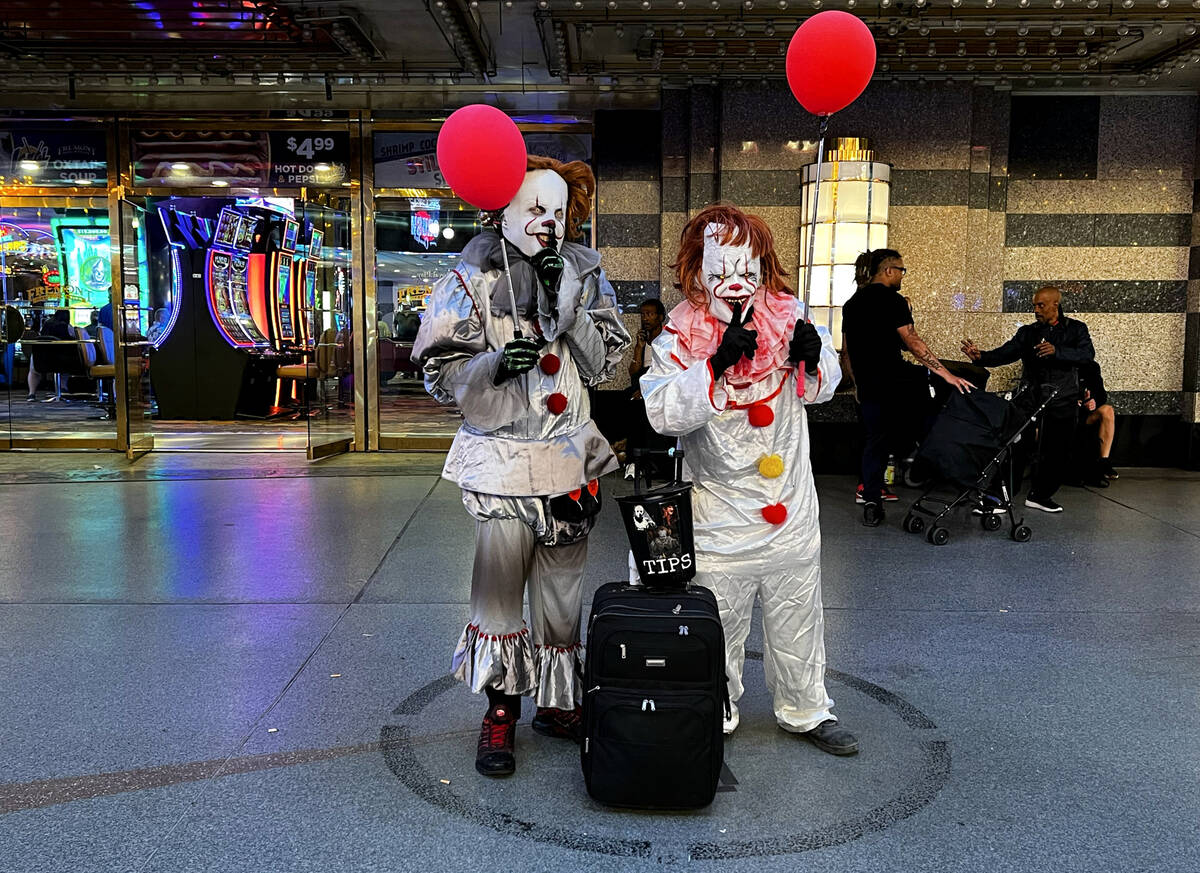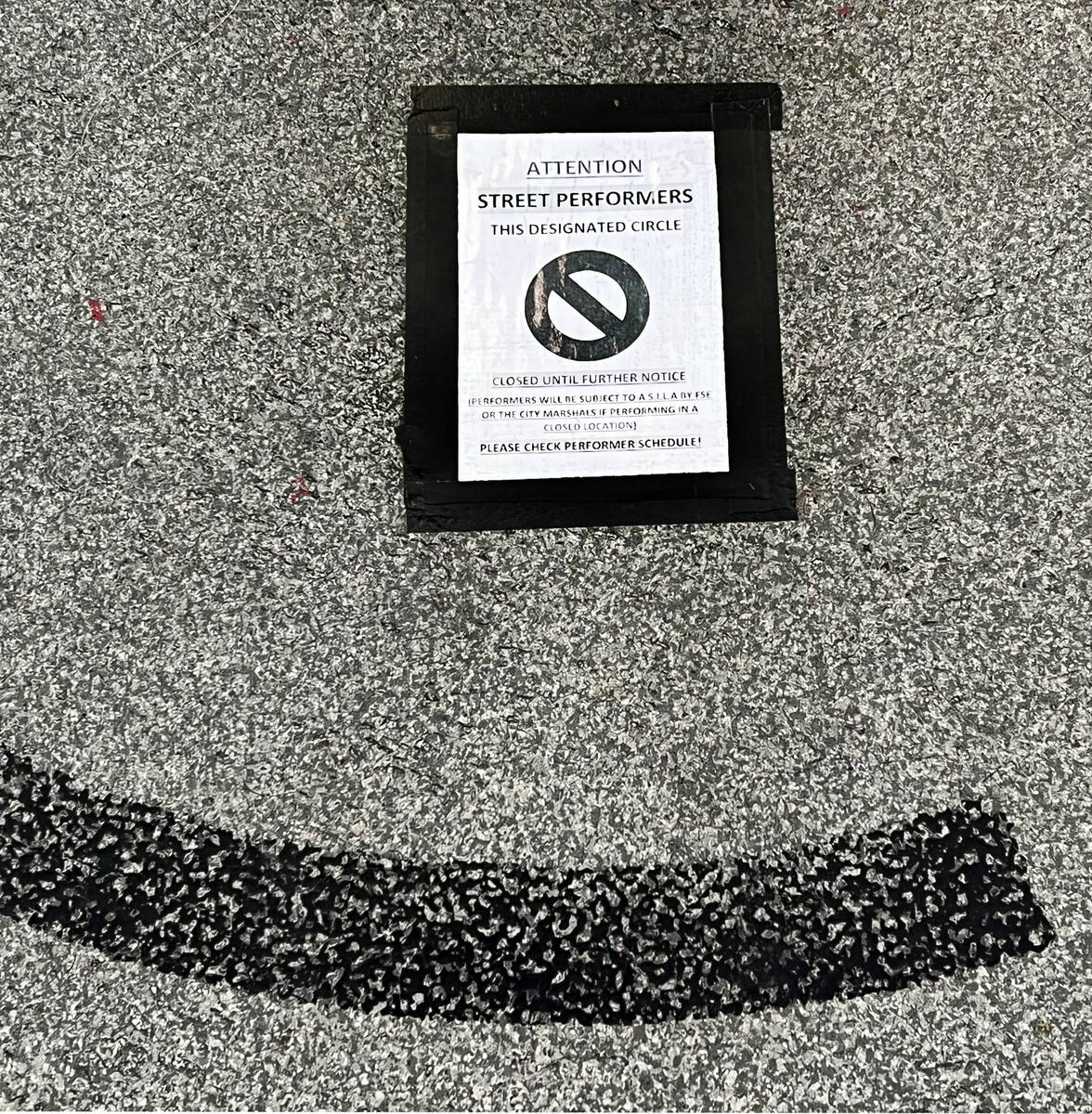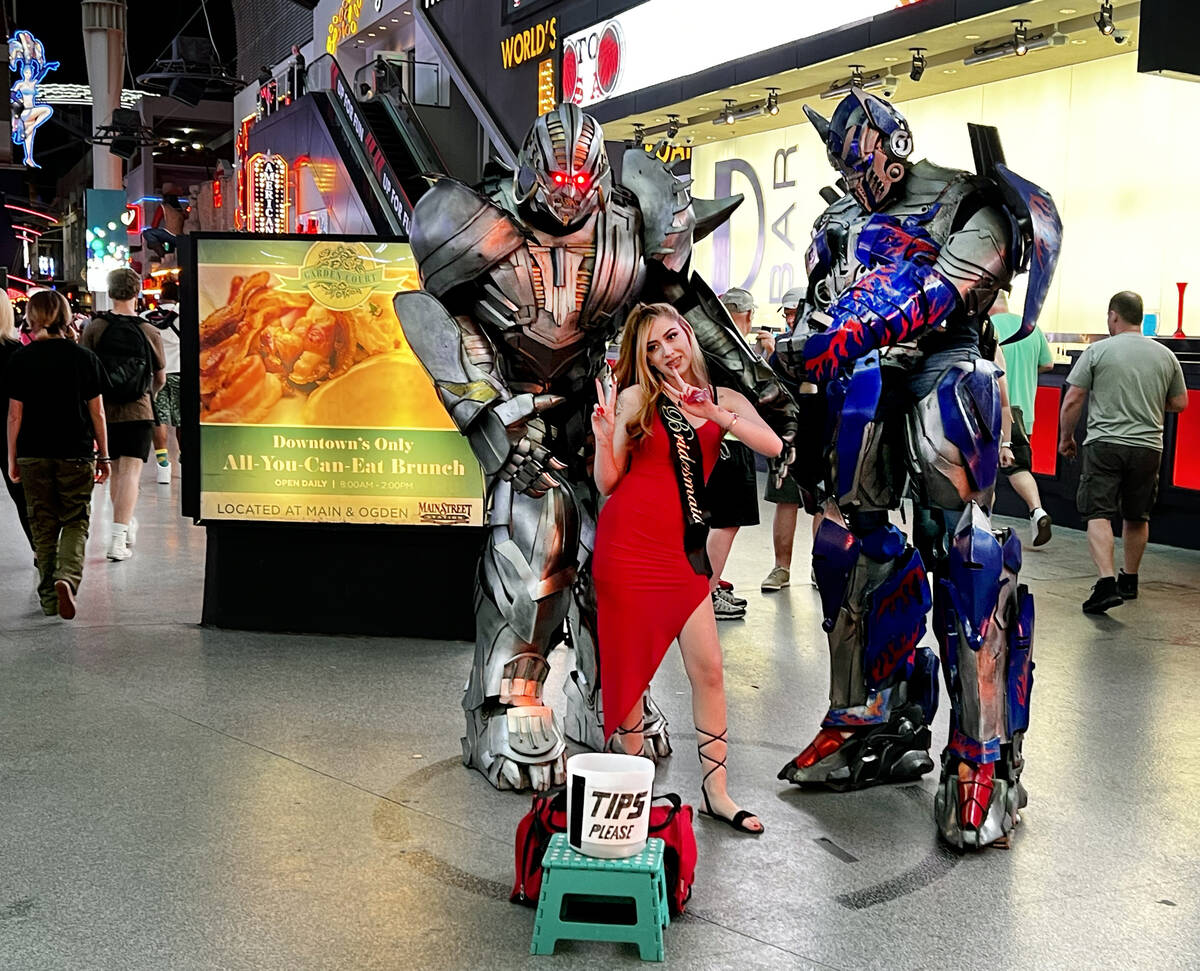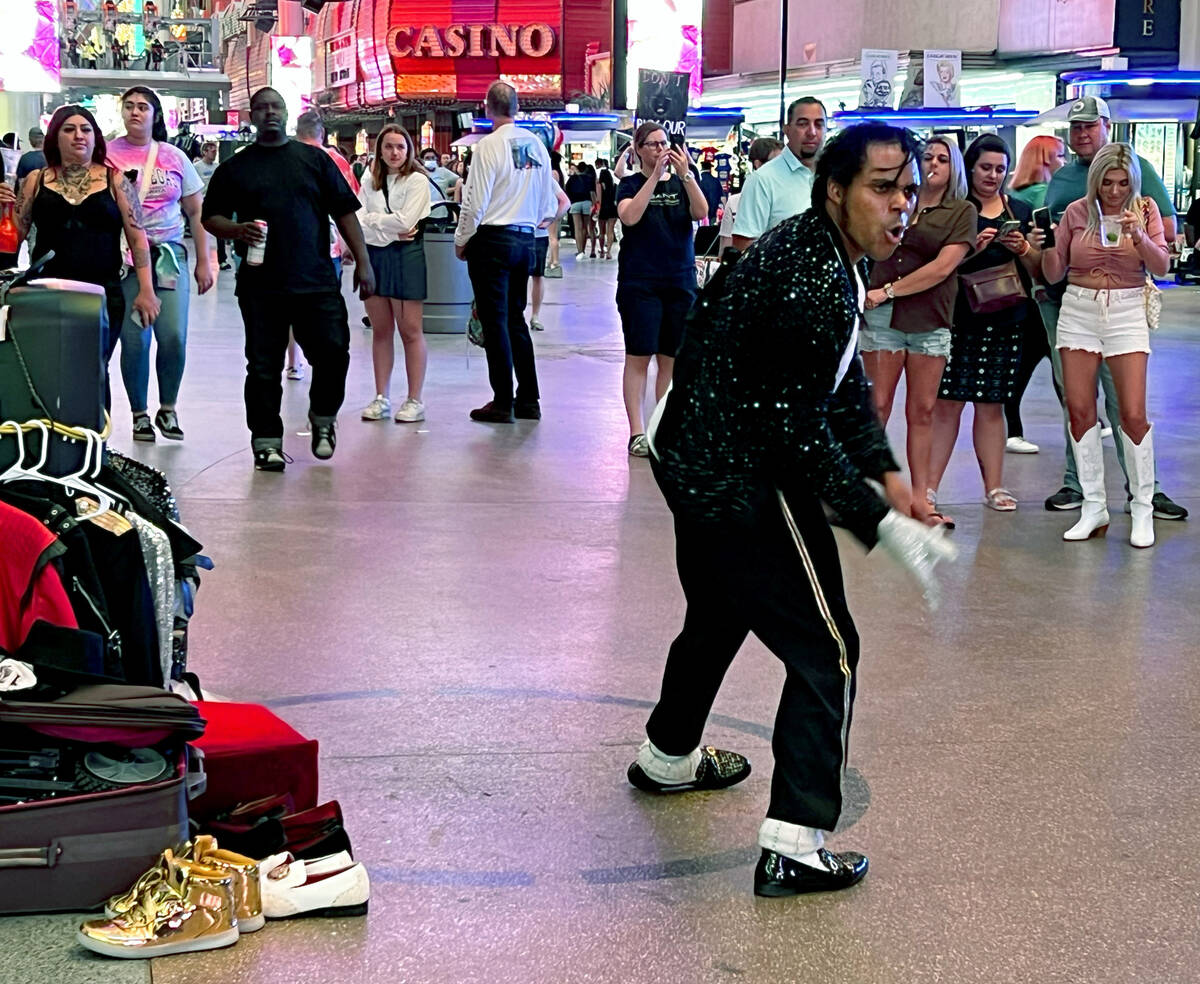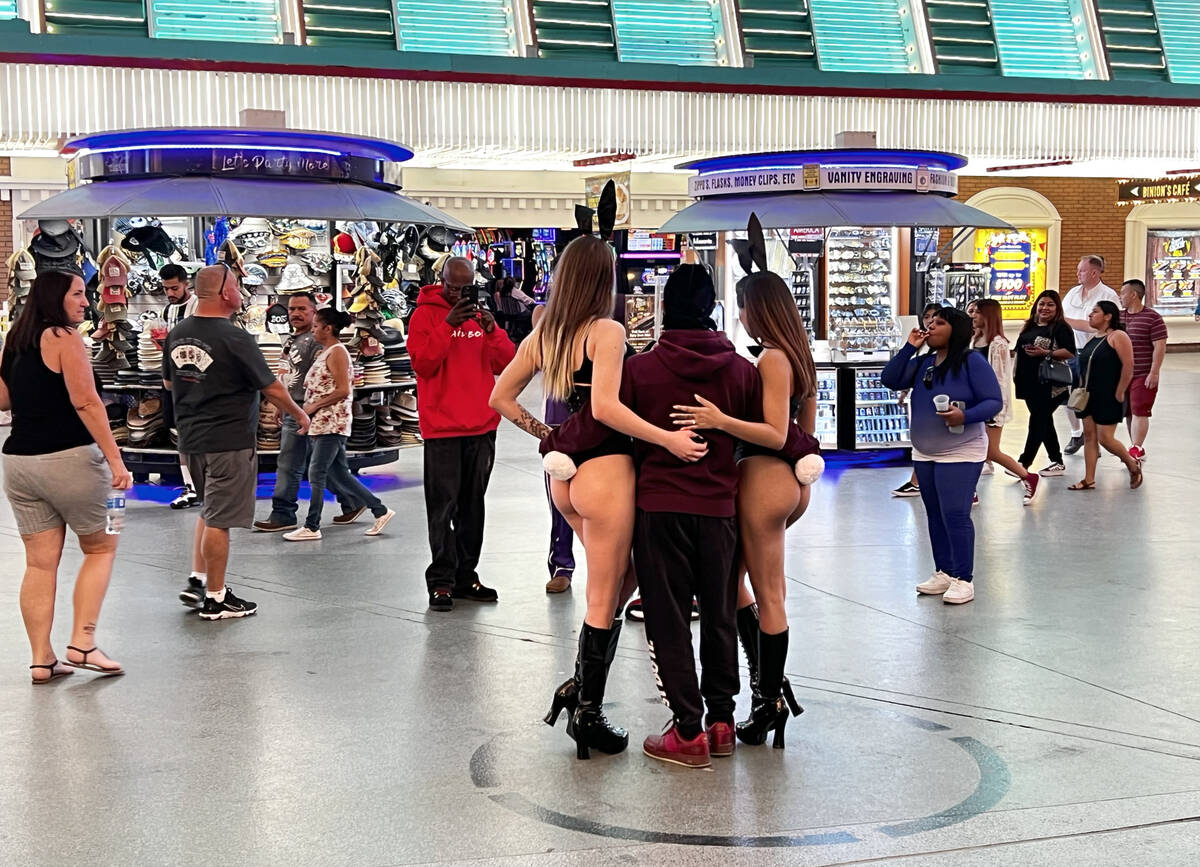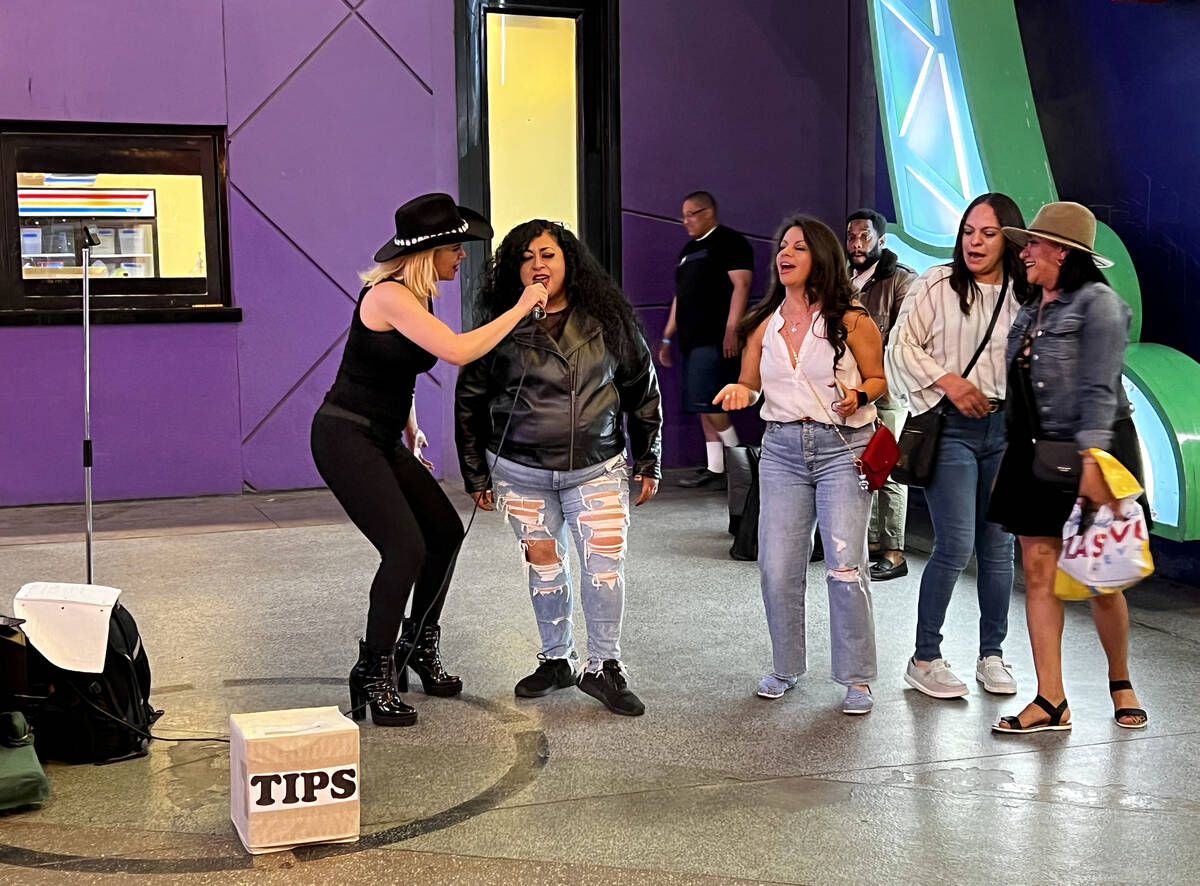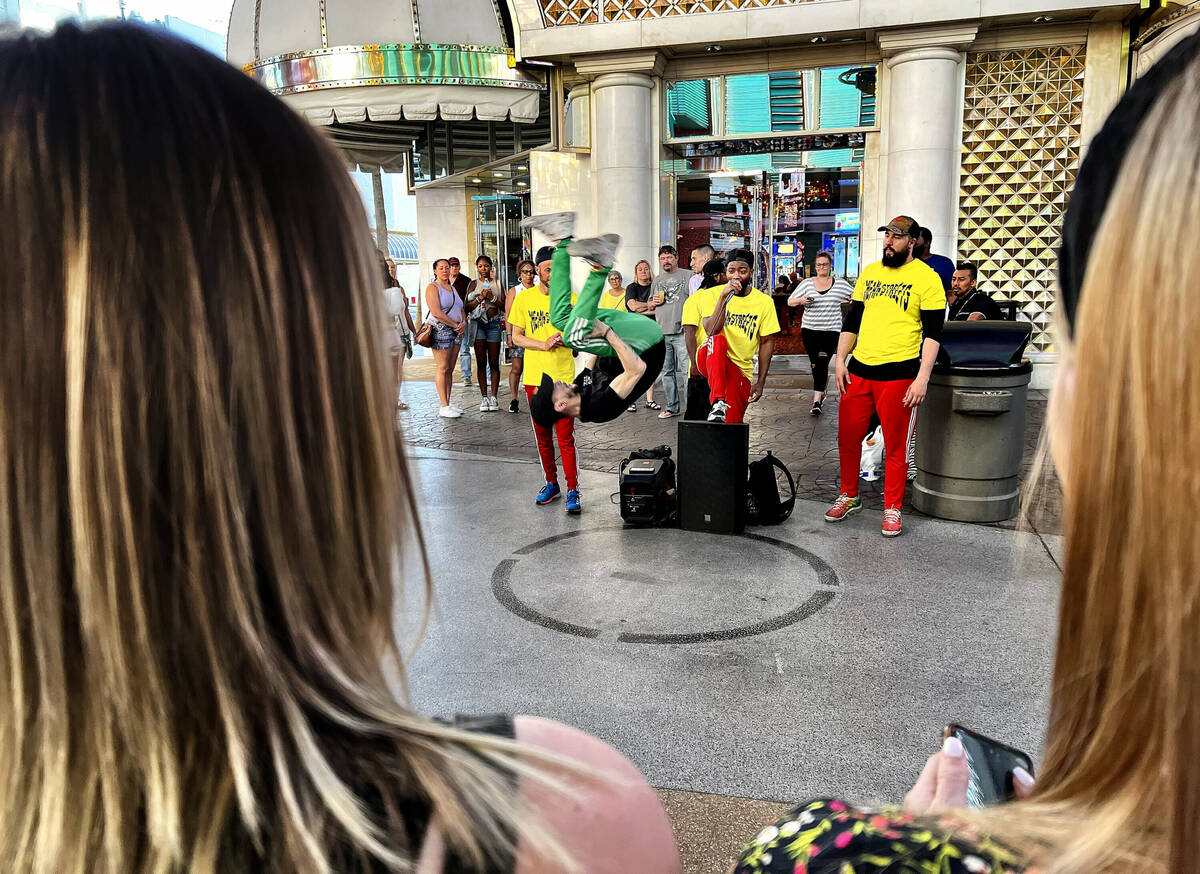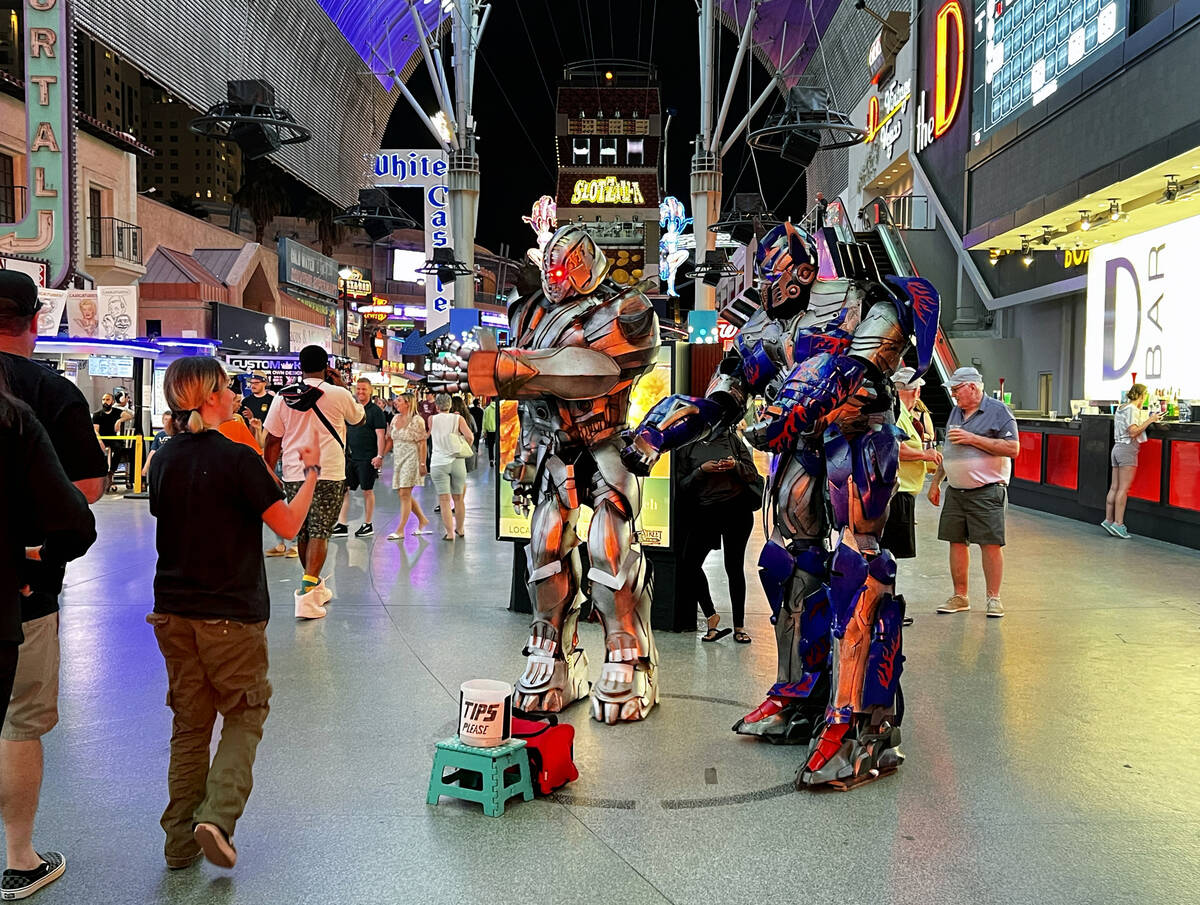City revisits Fremont Street performers rules after finding fraud
Nearly seven years of legislative and legal peace surrounding downtown Fremont Street’s public performers may be nearing an end, potentially setting a course for renewed controversy.
Las Vegas lawmakers in 2015 enacted new rules governing the movement of public performers on Fremont Street. City Council members did so with hopes of bringing order to the popular canopy-covered stretch of downtown, which had too often seen entertainers jostling for the best spots to attract tips from passersby.
The result was a city-administered, daily lottery system that would randomly assign registered performers to one of more than three dozen designated locations, each marked by 6-foot circles drawn on the pavement. Buskers could perform for no more than two hours.
But city officials say they have found an obvious issue with the computer-generated lottery system: Fraud.
“It has come to the city’s attention that the system has been taken advantage of by some performers who have been reserving spots and then transferring or selling those spots,” city spokesman Jace Radke said in a statement.
Now the city is proposing amended rules on street performances for only the second time in a decade, seeking to address exploitation of the system and other issues in the often eccentric and provocative trade within the famed pedestrian mall.
But the plan to update regulations will be controversial, if history is any indication. For more than two decades, the aptly named Fremont Street Experience has been the subject of a debate on free speech.
Michael Troy Moore, a street performer and labor organizer who claims he brought issues about the lottery system to the city in 2016, said that people like him are ultimately ambassadors of Las Vegas — a sideshow to the main draw.
“They just keep taking more and more,” he said about the city. “They act like there is no one to hold them accountable to the law.”
Rules adopted in 2011
Street performing is protected under the First Amendment of the U.S. Constitution. The city’s efforts to enact more restrictive rules barring unsanctioned entertainment under the canopy, dating to 1997, have been struck down in court.
In 2011, the City Council passed a less stringent ordinance to govern the five-block pedestrian mall, to the displeasure of then city lawmakers who sought tougher action. The rules were amended four years later to confine performance locations to one of 38 circles.
The American Civil Liberties Union of Nevada, which was involved in crafting city regulations in 2011 and 2015, indicated this week that it was willing to sue the city over its proposed changes, saying that street performers were being used to justify giving more power over the public mall to the Fremont Street Experience, the private entity that manages it.
“If we focus on the street performers, we’re missing the real problem here,” ACLU of Nevada Legal Director Christopher Peterson said.
Addressing loopholes
On Wednesday, the city introduced its amended ordinance, which cites “overwhelming evidence that certain street performers are being excluded from what are perceived as more desirable performance locations by other street performers who are engaging in fraudulent activity.”
The city acknowledged it has been unsuccessful in preventing the sale and barter of the in-demand permits that authorize performance locations and said that there have been hundreds of phantom or duplicate online accounts created in the system.
To address those loopholes, the city has proposed that street performers be explicitly barred from transferring an allotted location or assigned time period to anyone else and be required to obtain a photo verification card as part of their registration.
In addition, the city said some performers have tried to avoid enforcement of the rules enacted in 2015, invited pedestrians to participate in performances that present a safety risk and interfered with stage performances sponsored by the Fremont Street Experience.
Under the proposed amended rules, buskers would be forced to obtain commercial general liability insurance of at least $1 million if performances include the performer lying on the ground, acrobatics, physical participation from the audience or stage combat, according to the bill.
The amended ordinance, which will need to return to the council at least twice more before passage, also proposes a solution to curb “sound wars,” where competing performers increasingly amplify noise for attention, and lays out provisions for the use of unassigned locations, including for those performers who choose not to partake in the lottery system.
‘A company town’
The Fremont Street Experience, whose managing members include executives of surrounding casinos, draws more than 24 million annual visitors, according to its website, and gives tourists and locals access to eight casinos, 60-plus restaurants and retail kiosks and a zip line attraction.
Peterson, who joined the ACLU of Nevada a year ago, said he was concerned about the public mall’s privatization and street performance provisions that he believed were tantamount to making Fremont Street an extension of the casinos.
“This is the casinos acting like this is a company town, like some sort of mining town,” Peterson said. “What I’m seeing here is an ordinance that violates the constitution and raises some really important questions, especially for a city like ours.”
Although the Fremont Street Experience is the biggest culprit for noise and crowds, Peterson said it has consistently received exemptions and regulatory authority while street performers get maligned. And neither the city nor the Fremont Street Experience have tried to make the current system work, he claimed.
In one proposed amendment, the Fremont Street Experience would have the right to reserve designated performance locations between Main and Fourth streets for performers who sign and abide by a written code of conduct. Another requires the company’s consent for vendors or special events, although it would actually appear to relax a current rule that requires such commercial activities to be conducted by or on behalf of the company.
An effort this week to speak to a Fremont Street Experience official through a representative was unsuccessful.
Tourists compelled regulations
When rules on street performers were adopted in 2011, then-Mayor Oscar Goodman opined: “I don’t think the Fremont Street Experience is a public street. I think it’s a private enterprise.”
But court battles ultimately concluded that the pedestrian mall is indeed a traditional public forum, according to former City Attorney Brad Jerbic, who was instrumental in getting the city’s street performance ordinance passed and later amended.
Jerbic said he was a relatively new city attorney in the early 1990s when he received a directive that the city wished to start a public-private partnership in the central business district that was then crime-ridden and on an economic decline. It would require the city to put forth about two-thirds of the initial funding for the pedestrian mall. In exchange, the Fremont Street Experience would be responsible for all operations and maintenance.
Later, the impetus for addressing issues with street performers would come from tourists — not casinos — who expressed concern about people aggressively panhandling, exposing themselves and grabbing passersby, he said.
No ‘free-for-all’
Some proposals that did not make it into the amendments in 2015 have now resurfaced, including the photo ID requirement, which had been a late scratch seven years ago after it was opposed by the ACLU of Nevada, according to Jerbic, who retired in 2020 and was not involved in the most recent proposed amendments.
Street performers would have to produce their photo verification card upon anybody’s request, including members of the public.
Moore, the street performer, said there were constitutional issues with that proposal, noting that pedestrians do not even have to show their ID to a peace officer unless suspected of a crime.
For Peterson, the recently proposed amendments illustrate a growing power of private interests and an increasingly restrictive climate in downtown Las Vegas’ tourist corridor.
“Street performers are really the canary in the coal mine for something that has been happening in the past decade,” he said.
But the Fremont Street Experience’s recognized status as a public space does not mean that the government should not seek to regulate it in the least restrictive manner possible, Jerbic said.
“You’ve got to have some rules,” he said. “It can’t just be a free-for-all.”
Contact Shea Johnson at sjohnson@reviewjournal.com or 702-383-0272. Follow @Shea_LVRJ on Twitter.



